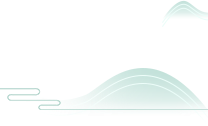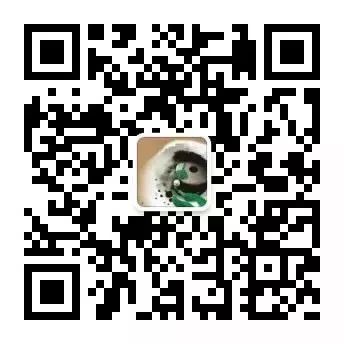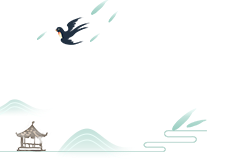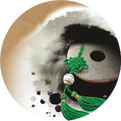Ren Shen (Ginseng)
Source and Distribution
Ren Shen is the root of the plant Panax ginseng, belonging to the Araliaceae family. It is primarily produced in Jilin, Liaoning, and Heilongjiang provinces. Cultivators refer to it as “garden ginseng”. Garden ginseng is typically harvested after 6 to 7 years of cultivation. Fresh ginseng that is cleaned and dried is called “sheng shai shen” (raw sun-dried ginseng); ginseng that is steamed and then dried is called “hong shen” (red ginseng); the fine roots that are processed and cut off are referred to as “shen xu” (ginseng whiskers). Wild ginseng that is sun-dried is called “sheng shai shan shen” (raw sun-dried mountain ginseng). It can be sliced or powdered for use.
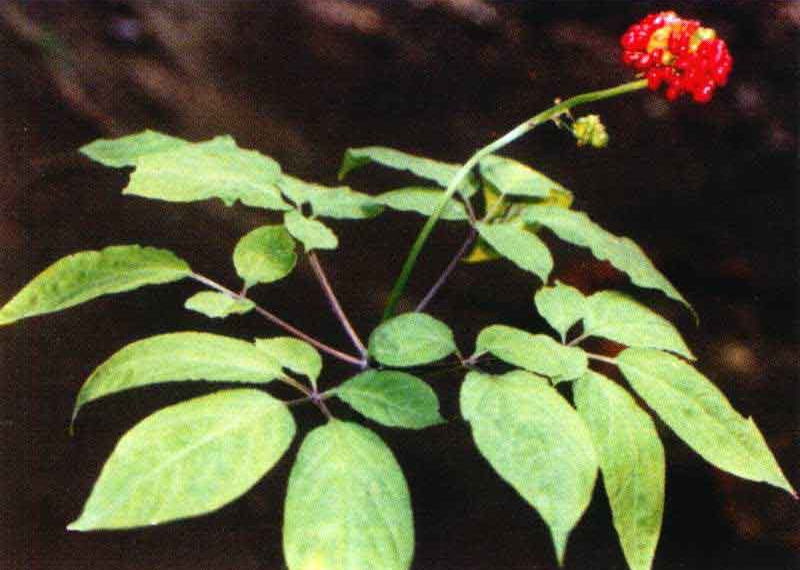
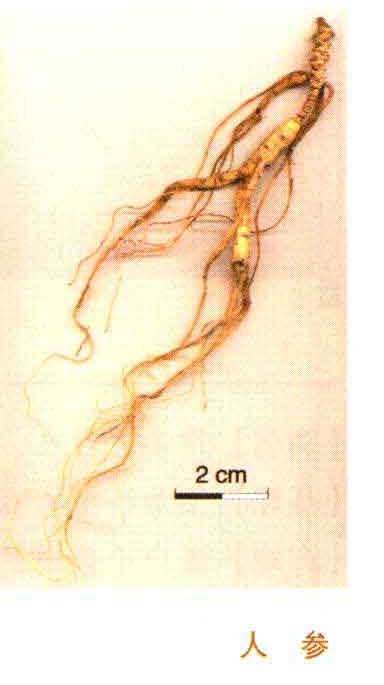
Effects and Indications
Ren Shen has a sweet and slightly bitter flavor, and is neutral in nature. It is associated with the Lung (Fei), Spleen (Pi), and Heart (Xin) meridians; it has the effects of greatly tonifying the original qi, tonifying the spleen and benefiting the lungs, generating fluids, calming the spirit, and enhancing intelligence.
Ren Shen is used to treat conditions of qi deficiency, such as severe qi collapse, and is a crucial medicine for rescuing from critical conditions. It is suitable for cases of extreme qi deficiency due to excessive sweating, diarrhea, blood loss, or prolonged illness, presenting with shortness of breath, fatigue, and a weak pulse. It can be used alone, as in the formula Du Shen Tang (Ginseng Decoction). If qi deficiency is accompanied by sweating and cold extremities, it can be combined with Fu Zi (Aconite) to tonify qi and rescue from collapse, as in Shen Fu Tang (Ginseng and Aconite Decoction). If qi deficiency is accompanied by sweating and a warm body, with a preference for cold drinks and a red, dry tongue, it is often combined with Mai Dong (Ophiopogon) and Wu Wei Zi (Schisandra) to tonify qi and nourish yin, as in Sheng Mai San (Generate the Pulse Powder).
Ren Shen is also a key herb for tonifying the lungs, improving symptoms of shortness of breath, wheezing, and weak voice due to lung qi deficiency. For treating cough and wheezing with phlegm, it is often combined with Wu Wei Zi, Su Zi (Perilla), and Xing Ren (Apricot Kernel), as in Bu Fei Tang (Tonify the Lungs Decoction). Additionally, it is a key herb for tonifying the spleen, improving symptoms of fatigue, poor appetite, and loose stools due to spleen qi deficiency. Since spleen deficiency often leads to damp stagnation, it is commonly combined with Bai Zhu (Atractylodes) and Fu Ling (Poria) to strengthen the spleen and resolve dampness, as in Si Jun Zi Tang (Four Gentlemen Decoction). If spleen qi deficiency leads to inability to control blood, resulting in chronic blood loss, Ren Shen can tonify qi to stabilize blood, often combined with Huang Qi (Astragalus) and Bai Zhu for tonifying the middle and benefiting qi, as in Gui Pi Tang (Restore the Spleen Decoction). If spleen qi deficiency leads to both qi and blood deficiency, Ren Shen can also tonify qi to generate blood, often combined with Dang Gui (Angelica) and Shu Di Huang (Rehmannia) as in Ba Zhen Tang (Eight Treasure Decoction).
Ren Shen can also tonify heart qi, improving symptoms of palpitations, anxiety, chest tightness, and weak pulse due to heart qi deficiency, and can calm the spirit and enhance intelligence, treating insomnia, vivid dreams, and forgetfulness. It is often combined with Suan Zao Ren (Sour Jujube Seed) and Bai Zi Ren (Platycladus) as in Tian Wang Bu Xin Dan (Heavenly Emperor’s Heart-Supplementing Pill).
Ren Shen also has a tonifying effect on kidney qi, which can be used for shortness of breath due to kidney not grasping qi, as well as for kidney deficiency leading to impotence. For treating deficiency-related wheezing, it is often combined with Ge Jie (Gecko), Wu Wei Zi, and Hu Tao Ren (Walnut). For kidney yang deficiency and impotence due to kidney essence deficiency, it is often combined with Lu Rong (Deer Antler) and other tonics for kidney yang and essence.
Ren Shen is also used to treat heat diseases with qi deficiency and fluid damage, as well as diabetes. For heat diseases causing both qi and fluid damage, with thirst and a weak, rapid pulse, Ren Shen can both tonify qi and generate fluids. For treating heat damaging qi and fluids, it is often combined with Zhi Mu (Anemarrhena) and Shi Gao (Gypsum) as in Bai Hu Jia Ren Shen Tang (White Tiger Decoction with Ginseng). Ren Shen can tonify the qi of the lungs, spleen, and kidneys, and generate fluids to relieve thirst, thus it is commonly used in formulas for treating diabetes.
Additionally, Ren Shen is often combined with exterior-releasing herbs and purgative herbs to expel pathogens in cases of qi deficiency with exterior invasion or interior heat accumulation with deficiency.
Modern Pharmacological Research
Ren Shen contains various ginsenosides, volatile oils, amino acids, trace elements, organic acids, sugars, and vitamins.
Ren Shen has anti-shock effects, and ginseng injection is particularly effective for patients with hemorrhagic shock and acute toxic shock; it can significantly increase cardiac amplitude and heart rate, and has a more pronounced cardiotonic effect in cases of heart failure.
Ren Shen can stimulate the pituitary-adrenal cortex system, enhancing stress response capabilities; it enhances both excitatory and inhibitory processes of higher nervous activity; it can increase the flexibility of neural activity processes, improving cognitive function; it has anti-fatigue effects, promotes the synthesis of proteins, RNA, and DNA, enhances hematopoietic function, and regulates cholesterol metabolism; it can enhance immune function; it can enhance gonadal function, exhibiting gonadotropin-like effects; and it can lower blood sugar.
Furthermore, Ren Shen has various effects including anti-inflammatory, anti-allergic, diuretic, and anti-tumor properties. The pharmacological activity of Ren Shen can exhibit bidirectional effects depending on the functional state of the body.
Long-term use of Ren Shen or ginseng preparations may lead to adverse reactions such as diarrhea, rashes, insomnia, nervousness, elevated blood pressure, depression, increased libido (or decreased sexual function), headaches, and palpitations. Hemorrhage is a characteristic of acute ginseng poisoning. Clinical reports also include ginseng and gecko extract causing exfoliative dermatitis, and ginseng royal jelly exacerbating acute nephritis with hematuria.
Dosage, Administration, and Precautions
Decocted in water, 3-9g; for rescuing from collapse, 15-30g can be used. It is best to simmer gently and take in divided doses. Wild mountain ginseng can be ground into powder and taken in doses of 2g, twice daily. Ren Shen should not be used in combination with Li Lu (Veratrum).
Beauty Dermatology Prescription
For skin aging, qi and blood deficiency, and sallow complexion, use 9g of Ren Shen, 12g of Shu Di Huang, 12g of Dang Gui, 12g of Bai Shao, and 9g of Bai Zhu. After decocting, add an appropriate amount of honey for consumption.
References: “Traditional Chinese Medicine”, “Color Atlas of Chinese Herbal Medicine”, etc.
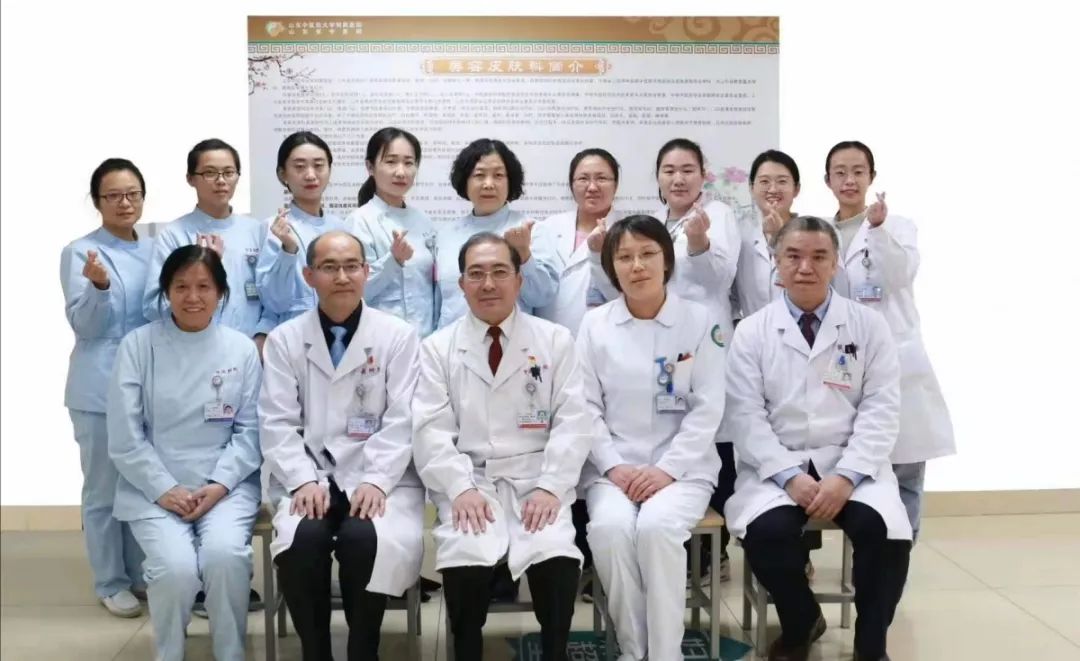
Qianfo Mountain Hospital Address: 4th Floor, South End, Bian Que Building, No. 16369, Jing Shi Road, Lixia District, Jinan City
Baotu Spring Hospital Address: East End, 5th Floor, Outpatient Building, No. 42, Wenhua West Road, Lixia District, Jinan City
Contact Number: 0531-68616422 (Qianfo Mountain Hospital); 0531-68617912 (Baotu Spring Hospital)
Scan to follow for more exciting content
